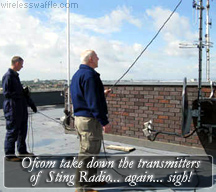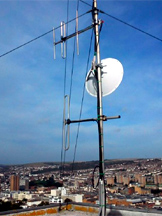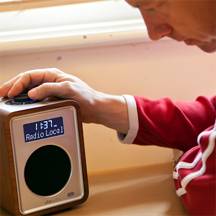 No sooner had Wireless Waffle discovered the existence of one medium wave pirate, another one pops up. Paradise FM was being received loud and relatively clear last night on 1440 kHz (now clear of the sadly defunkt 'Great 208') around 21:00 GMT. The web-site gives phone contact numbers in Belgium but it is written in German, and gives details for a town called Mont Rigi which is in the German speaking part of Belgium (you knew German was an official language of Belgium right?)
No sooner had Wireless Waffle discovered the existence of one medium wave pirate, another one pops up. Paradise FM was being received loud and relatively clear last night on 1440 kHz (now clear of the sadly defunkt 'Great 208') around 21:00 GMT. The web-site gives phone contact numbers in Belgium but it is written in German, and gives details for a town called Mont Rigi which is in the German speaking part of Belgium (you knew German was an official language of Belgium right?) Their web-site also declares that the station is on FM and AM Stereo but no frequency for either is given and as the receiver we were using does not decode AM stereo, this possibility could not be confirmed. Also, there is no FM frequency for any station called 'Paradise' listed in that area of Belgium but if it is a pirate, that is to be expected! Nonetheless, perhaps the Belgian/German heritage is valid.
Either way, it seems that the medium wave band is not as dead and boring as we hadn't given it credit for. Long live medium wave!
1 comment
( 707 views )
| permalink
| 



 ( 2.9 / 8563 )
( 2.9 / 8563 )




 ( 2.9 / 8563 )
( 2.9 / 8563 )
Thursday 24 March, 2016, 12:50 - Broadcasting, Pirate/Clandestine, Spectrum Management
Posted by Administrator
This week, Wireless Waffle took a rare trip to the far reaches of the UK. Or Birmingham to be precise. To be even more precise, the motorways surrounding the UK's second city, whilst en route to elsewhere. The journey gave the opportunity to do a bit of tuning around the FM band to see what's happening in the West Midlands these days. Other than the various commercial stations (including local regional stations Touch FM and Free Radio), and a handful of community stations (including some in neighbouring Coventry), the thing that was most different to the airwaves in the South East was the absence of much in the way of pirate radio.Posted by Administrator
 Only two pirate stations were heard during the journey:
Only two pirate stations were heard during the journey:- Hot92 on 92.0 MHz, and
- Sting Radio on 97.5 MHz.
- Silk City Radio on 90.0 MHz,
- Kriss FM on 95.1 MHz, and
- Distinct FM on 99.7 MHz.
It's probably about time that Wireless Waffle stopped banging on about pirate radion stations, after all it's now just a year shy of the 50th anniversary of the Marine etc Offences Act whose purpose was primarily to bring down the original pirate stations of the day. The fact, however, that such stations continue to abound suggests that the mainstream UK radio market is failing certain sections of society, which appear to be certain ethnic minorities (Caribbean, African and Turkish in particular) and those who like gruff-beat, wacka-jam and gutter-beat music (or genres with similiarly bizarre titles). It's also clear that Ofcom's efforts to take the stations off-air is not having the desired effect (meaning 'to force pirates off-air').
Information on enforcement activity released by Ofcom under the freedom of information act reveals, for example, that between 2007 and 2012, Kriss FM had its transmitters taken off-air by Ofcom 17 times and its studios raided 6 times. Hot92 had its transmitter raided 42 times and its studio raided 3 times. Sting had an astounding 60 transmitter raids (and 3 studio raids) over the same period.
 We recently discussed the idea that pirate radio could move to small-scale DAB radio services, or conversely that the closure of regular FM services might open up the FM band as a playground for even more pirates. But could there be yet another option... If Ofcom were to cease all enforcement activity on pirate radio (except in casese where it was causing interference to safety-of-life services) and let the illegal broadcasters run riot, the amount of intereference they would cause to legitimate stations would increase and this might be the incentive needed for those listeners to finally go out and buy a digital radio! So instead of continued enforcement, why not leave the pirates alone and see if that has the desired effect (in this case meaning 'forcing a move to digital radio').
We recently discussed the idea that pirate radio could move to small-scale DAB radio services, or conversely that the closure of regular FM services might open up the FM band as a playground for even more pirates. But could there be yet another option... If Ofcom were to cease all enforcement activity on pirate radio (except in casese where it was causing interference to safety-of-life services) and let the illegal broadcasters run riot, the amount of intereference they would cause to legitimate stations would increase and this might be the incentive needed for those listeners to finally go out and buy a digital radio! So instead of continued enforcement, why not leave the pirates alone and see if that has the desired effect (in this case meaning 'forcing a move to digital radio').Saturday 23 January, 2016, 11:49 - Broadcasting, Licensed, Pirate/Clandestine, Radio Randomness, Spectrum Management
Posted by Administrator
The number of pirate radio stations on-air in London does not appear to have diminished over the past 10 or more years, despite there now being many legal ways in which stations could reach their audiences, most recently though streaming audio on-line.Posted by Administrator
 Ofcom has recently proposed that many local radio stations could be accommodated on 'small scale DAB' transmitters which provide a localised service, and it is conducting a number of trials around the UK of such a service. The idea is to use low cost hardware and software to develop the DAB signals, for example using a USRP software radio, and the various software tools provided by the Open Digital Radio project. Using these, it is possible to put a (very) low power DAB station on-air for less than GBP1000 and with a suitable power amplifier (for example a 30 Watt Mitsubishi amplifier module, or how's about a 1.2 kW amplifier module), a DAB transmitter with reasonable coverage can be built for not that much more. Indeed research conducted for Ofcom suggests that a 100 Watt e.r.p. service using such technology could be provided to broadcasters for around GBP1400 per year (at a bit rate of 160 kbps which is far higher quality than most of the existing UK DAB services!)
Ofcom has recently proposed that many local radio stations could be accommodated on 'small scale DAB' transmitters which provide a localised service, and it is conducting a number of trials around the UK of such a service. The idea is to use low cost hardware and software to develop the DAB signals, for example using a USRP software radio, and the various software tools provided by the Open Digital Radio project. Using these, it is possible to put a (very) low power DAB station on-air for less than GBP1000 and with a suitable power amplifier (for example a 30 Watt Mitsubishi amplifier module, or how's about a 1.2 kW amplifier module), a DAB transmitter with reasonable coverage can be built for not that much more. Indeed research conducted for Ofcom suggests that a 100 Watt e.r.p. service using such technology could be provided to broadcasters for around GBP1400 per year (at a bit rate of 160 kbps which is far higher quality than most of the existing UK DAB services!)An article in spectrum newsletter PolicyTracker entitled, 'Can DAB save us from the pirates?' (note - a subscription is required to read the full article), makes the point that the criteria which the UK has set to begin the digital switch-over of radio services (e.g. the turning off of analogue services in favour of digital) is almost upon us. The criteria is that 50% of UK listening should be on a digital platform (whether DAB, on-line, cable, satellite or other) and the latest figures show this is now up to 43%, though as Wireless Waffle has pointed out before, the proportion of digital listening appears to have stagnated. If the UK does set a date for the winding down of FM radio, one of two things could happen:
- pirates may move to digital platforms, in order to be found on the same dial as other stations; or
- pirates may take the opportunity of an emptier FM band to choose clearer frequencies, increase their power, or just increase the number of services.
The problem is that in either case there is no guarantee that the pirates would do this in a legal fashion. Pirate radio stations are not renowned for co-operating with each other so why would they pay to be on a DAB platform, rather than buy the equipment themselves and set up digital pirate stations? The answer might come in the form of the reduced number of frequencies available. In the FM band, assuming a station every 300 kHz (which is just about OK from an interference perspective), there is room for 68 stations on the dial. Taking into account the 20 or so legal stations already on-air in London (depending on what you count as London), this leaves a potential for 48 pirates. For DAB radio, which requires 1.4 MHz of spectrum to operate, there is room for just 32 transmissions in any one location. In London 4 of these frequency blocks are in use, leaving 28 'available'.
 "Ah", you say, "but each DAB multiplex can carry 10 or more stations, so really the number is 280". That is true, but this requires the pirates to club together to buy and operate the equipment and, as already stated, they aren't that good at this. Perhaps the business model they employ could change, and a smaller number of illegal transmitter operators could provide services to multiple pirate stations. Or perhaps a small number of legal transmitter operators could provide the same service. The problem here seems to be that in order to legitimise the pirates, they would have to be invited to 'come in from the cold', and Ofcom would have to have a set of licensing policies that were sufficiently lax to permit 24 stations all playing the same kind of electro-shed, play-house or garage-door music onto the dial. It is almost certain that the existing legitimate stations would object to this on the grounds that it would provide unfair competition. But the fact is that such competition already exists on the FM band, and at least if it were done under a licensed framework, there would be some control over what went on, and thus greater protection of the existing 'big boys'.
"Ah", you say, "but each DAB multiplex can carry 10 or more stations, so really the number is 280". That is true, but this requires the pirates to club together to buy and operate the equipment and, as already stated, they aren't that good at this. Perhaps the business model they employ could change, and a smaller number of illegal transmitter operators could provide services to multiple pirate stations. Or perhaps a small number of legal transmitter operators could provide the same service. The problem here seems to be that in order to legitimise the pirates, they would have to be invited to 'come in from the cold', and Ofcom would have to have a set of licensing policies that were sufficiently lax to permit 24 stations all playing the same kind of electro-shed, play-house or garage-door music onto the dial. It is almost certain that the existing legitimate stations would object to this on the grounds that it would provide unfair competition. But the fact is that such competition already exists on the FM band, and at least if it were done under a licensed framework, there would be some control over what went on, and thus greater protection of the existing 'big boys'.Maybe Ofcom could take a leaf out of the book of the Lebanese regulator (the TRA) who offered all unlicensed FM operators (which was a large proportion of the country's stations at the time), a licence, if they came forward and provided the necessary details of their transmitting facilities (power, frequency, antenna height and so on). Most stations did this, wishing to gain legitimacy for their service. As soon as they did, however, the TRA could begin to change frequencies, powers and so on to bring the stations in-line, through a proper legal framework that allowed them to inflict penalties if people refused.
 Another model might be for Ofcom to licence small-scale DAB operators, but not to set any criteria over which stations are carried on the multiplex, other than their normal broadcasting code which is designed, for example, to stop politically motivated stations from using the airwaves in an partial way. Other than a bit of swearing here and there, most pirate stations would probably already meet most of the rules. This is not dissimilar to the way in which Ofcom licenses digital television, with multiplexes being awarded to companies who are then largely at liberty to select which programmes they include.
Another model might be for Ofcom to licence small-scale DAB operators, but not to set any criteria over which stations are carried on the multiplex, other than their normal broadcasting code which is designed, for example, to stop politically motivated stations from using the airwaves in an partial way. Other than a bit of swearing here and there, most pirate stations would probably already meet most of the rules. This is not dissimilar to the way in which Ofcom licenses digital television, with multiplexes being awarded to companies who are then largely at liberty to select which programmes they include.In either of the above cases, whether the idea that Ofcom could have an 'amnesty' for pirates, if they agreed to go onto small DAB multiplexes, or if the operation of the DAB multiplexes were made flexible enough to accommodate pirate stations being on them, there might be a sufficient increase the listening to DAB services such that the necessary 50% switch-over threshold is reached sooner rather than later. A 'win-win' situation?
Monday 2 December, 2013, 22:04 - Pirate/Clandestine
Posted by Administrator
With thanks to Keith over at the other Wireless Waffle for bringing this to our attention. Pirate Wogan has to be one of the best pieces of radio broadcasting since Chris Morris's various shows on BBC Radio London and Radio 1. Invented by Peter Serafinowicz the concept is a simple one. Put Terry Wogan (or T-Wog$ as he is now to be known) in front of a microphone on a fictitious pirate radio station and record the ensuing mayhem.Posted by Administrator
Not only is the result hilarious (up there with '10 things to change the world' - which you can hear on the Cook'd and Bomb'd web-site) but it's available in app format too!
 The Pirate Wogan app allows you to loop various drum and bass sounds together with samples of T-Wog$ to produce your very own London pirate sound-alike. In principal you should get bored in no time, but there is something hypnotic about the combination of T-Wog$ dulcet tones and the deep dark bass throb of the music.
The Pirate Wogan app allows you to loop various drum and bass sounds together with samples of T-Wog$ to produce your very own London pirate sound-alike. In principal you should get bored in no time, but there is something hypnotic about the combination of T-Wog$ dulcet tones and the deep dark bass throb of the music. Big up the Wireless massive. Easy now.

